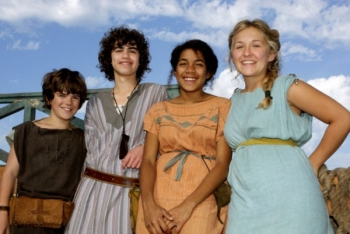
The rest of the conference went just as well as the first half. I especially enjoyed talking to Tracy Barrett about writing and Caroline Lawrence's talk was a really interesting glimpse into how she goes about writing her books. I think my paper went OK, and I very much enjoyed the other papers in my panel, though I was a bit worried I was repeating what everyone else had said!
I bought Trimalchio's Feast, a selection of short stories from the bookstall which are part of Caroline's The Roman Mysteries series. Having been assured that the first two stories wouldn't spoil the books for me too much, I dived right in and read the first two, 'The Case of the Missing Coin' and 'Trimalchio's Feast'. I had been introduced to the characters through the talks, so I had some idea who everyone was, and the stories explained who they all were anyway.
I was amazed by how much detail was in these very short stories. They are a brilliant introduction to daily life in ancient Rome and I love the way the stories exist within such a well defined timeline (they all take place within the short reign of Titus).
I especially loved the literary allusions - 'Trimalchio's Dinner' is one of my favourite pieces of ancient fiction. It's the longest surviving section from Petronius' 1st century AD novel The Satyricon, and describes what Petronius clearly considered to be the worst possible dinner party, hosted by the eponymous Trimalchio. During the course of the dinner he:
Picks his teeth with a silver toothpick in front of everyone
Has his slaves wash the guests’ hands with wine because there is no water available
Hits a slave on the ear for picking up a fallen silver platter, which he then orders thrown away
Claims to be serving Falernian wine from the consulship of Opimius, when the wine wasn’t being bottled at that time.
Describes his constipation and subsequent relief to everyone, and encourages everyone to fart if they feel the need, as he does.
Makes terrible jokes – for example, he keeps yelling ‘Carpe!’ at the slave cutting the meat, whose name is Carpus – Carpe being both the vocative form of Carpus and the imperative of the verb carpo, to cut (in English translations, given as ‘Carve ‘er, Carver!’ but it does not quite work).
You can read the whole section here.
The Trimalchio in the story is equally disruptive, though in a different way, as he is a monkey. There's also a lovely birthday ode that references lots of mythology (which hopefully children will be encouraged to go and look up) and refers to the 'wine-dark sea' - the Homeric epithet for the sea, which made me grin.
It did take me a minute to get used to Flavia calling her father 'Pater' - I kept picturing a strange cartoon boy going on about his 'pater' (I think I got this from an old Rupert cartoon I caught on TV last week). I understood why she did when I noticed that the Jewish boy called his father 'Father' - so the name differentiates between their languages, like the African Nubia's odd 'Latin' (i.e. archaic English). I enjoyed the little bits of Latin that were thrown in - again, hopefully that may encourage children to be interested in Latin.

All in all, it was a really good conference and I now have lots of books to go and read! (Well, to go and read in October anyway). Maybe I will even get back to my own stilted attempts at writing fiction - eventually...
The four children from the TV adaptation of The Roman Mysteries
Sorry I missed your talk, Juliette. Get in touch and we'll talk about dreams. In the meantime, check out my blog! http://flavias.blogspot.com/
ReplyDeleteDaily life in ancient Rome? Trimalchio is 'supposed' to be in Puteoli, isn't he? Somewhere in Campania anyway! Glad you enjoyed the conference.
ReplyDeleteI meant the ancient Roman world in general, not specifically the city itself. The books go all over the place.
ReplyDeleteHehe. I know, I was just joshing. To one who works on the Urbs itself, the name is very specific. I haven't read any of these but remember leafing through one (I think the Ostia one) and noticing an interesting discussion about street terminology.
ReplyDelete